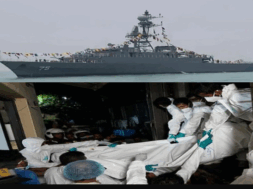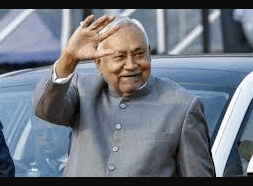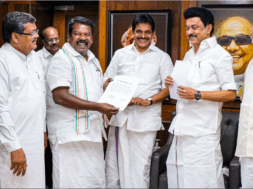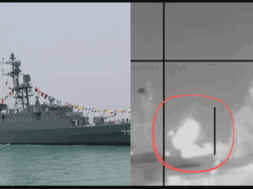
Kolkata Rape and Murder: Junior Doctors are Back to Work, 90 to 98% Safety Infrastructure Complete
NEW DELHI, Oct 15: The Supreme Court on Tuesday was informed by the West Bengal government that barring the seven junior doctors who are on indefinite fast, all other protesting junior doctors in the state have resumed work.
The state government in its affidavit also claimed that the junior doctors returned to duty because 90% to 98% of work on infrastructure and safety upgrades across government medical colleges and hospitals was complete. The junior doctors agreed with the state government’s contention on both the counts.
A three-judge bench headed by the Chief Justice of India DY Chandrachud also found that the National Task Force (NTF) constituted by the Centre on the orders of the Supreme Court in August had not met after September 9. The task force was formed to primarily frame a national protocol addressing work safety and infrastructural facilities available to doctors and medical staff at their workplaces across Indi following the brutal rape and murder of a junior doctor at the RG Kar Medical College and Hospital in Kolkata on August 9.
“But the task force has made no substantial progress. It has not met after September 9,” Chief Justice Chandrachud observed. Solicitor General Tushar Mehta, appearing for the Centre, said the task force was meant to find a “long-lasting solution” and this would take time. The NTF had received 7,688 responses from across the country. It would take time to sift through each one of them before actually framing the protocol, Mr Mehta said. The Bench gave the NTF three weeks to come out with “tentative recommendations” and place them before the court.
Appearing for the West Bengal government, senior advocate Rakesh Dwivedi said its safety and infrastructural improvements in government medical colleges, hospitals and medical centres would be completed by October 25. The work at RG Kar would take a few days more, by October 31, to complete as the Central Bureau of Investigation (CBI) probing the rape and murder case gave permissions only on October 9 and October 14. He said the government was in talks with the doctors on hunger strike.
Mr Dwivedi said the State had started a pilot project called the ‘Integrated Hospital Management System’ to “capture every step of patient treatment.” The system would help patients gain online access to information about medical and other facilities available in government hospitals.
Senior advocate Indira Jaising, for doctors, said the IHMS should also have the capacity to ensure that patient referrals were made to other hospitals with free beds and medical facilities. Ms Jaising said patients otherwise turn their ire on doctors for erroneous referrals.
The SC also directed the West Bengal government to come clean on the “source of authority” by which civic volunteers like the RG Kar rape and murder accused Sanjay Roy was recruited, especially in sensitive areas such as schools and hospitals. The CJI said employing political acolytes and sympathisers as ‘civic volunteers’ could be a “nice process of conferring political patronage on people who are totally unverified.”
The court turned the spotlight on the role of civic volunteers in West Bengal after senior advocate Karuna Nundy, appearing for junior doctors, drew the Bench’s attention to the “band of civilians” entrusted with policing powers under the Rattirer Sathi scheme. Ms Nundy submitted that, rather than disbanding them, the State has doubled down on the recruitments.
Mr Dwivedi flatly denied the claim of Ms Nundy. He said the government had stopped the recruitment of ‘civic volunteers’, and was currently hiring security personnel under the Private Security Agencies (Regulation) Act of 2005, which was a Central law. The personnel were procured from licensed security agencies as in every other State in the country.
Mr Dwivedi said Sanjay Roy was recruited on the basis of a police notification. He had not even been “posted” at the RG Kar at the time of the murder and rape of the junior doctor on August 9. The CBI charge-sheet has accused him of offences under Sections 63 (rape), 66 (causing death of a woman while committing rape or leaving her in a persistent vegetative state) and 103(1) (murder). The offences are punishable by either life imprisonment or death penalty.
Meanwhile, the CBI informed the top court that an Additional Sessions Judge in Sealdah has scheduled the framing of charges against Roy for November 4. The Central agency informed the court through its fifth status report that investigation into the alleged involvement of “others” in the rape and murder was under way. A separate probe into the allegations of financial fraud was also on.
(Manas Dasgupta)














